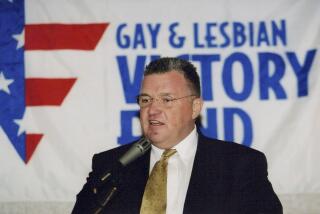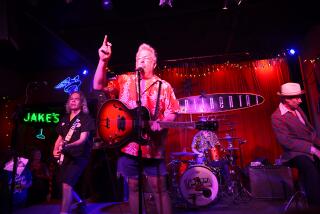Nixon Library Is Launched in Yorba Linda
With the faithful of the Nixon Administration joined by Orange County politicians and still-devoted followers, ground was broken in Yorba Linda Friday for the much-delayed Richard M. Nixon Presidential Library, 14 years after he resigned from office.
“Only history can be the judge of the greatness of Mr. Nixon,” said the former President’s daughter, Julie Nixon Eisenhower, as Santa Ana winds blanketed the small north Orange County community in a soft heat.
The 75-year-old former President did not attend the ceremonies, choosing to remain at home in New Jersey and saying through a spokesman that a busy schedule had prevented him from attending.
The ground breaking was followed by a private dinner featuring a speech by former Secretary of State Henry A. Kissinger.
The day’s events attracted a cross section of longtime associates of the 37th President. They included Maurice H. Stans, Nixon’s secretary of commerce; former White House Chief of Staff H. R. (Bob) Haldeman and Nixon friends Bebe Rebozo and Robert Abplanalp.
The not-so-famous but equally devoted also were there, from Carl Howell, a security officer in the White House during the Nixon years, to Bob Dunn, a Navy medic whose duties included following the President across the world in his travels.
One of those present was Edith Eichler, the 94-year-old widow who once was to be evicted from her home to make room for the library. Nixon himself intervened and her home was left standing on the property.
“It was a wonderful day,” she said. “The speeches were great, and I loved the band.”
More than 1,500 people attended the ground breaking on a grassy plain surrounded by housing tracts and small businesses.
Former California Lt. Gov. Robert Finch, who served as Nixon’s secretary of health, education and welfare, said the library was “not going to be a theater of adulation and puffery. . . . “
“It will observe his strengths and weaknesses,” he said.
Mrs. Eisenhower, 40, kicked off the ceremonies for construction of the privately funded, $25-million complex by setting off a loud air horn. The library is being built just a few feet from the front door of the small frame house where her father was born 75 years ago.
‘A Very Special Day’
“This is a very special day. I feel as if I’ve come home. For our family and for my father, this is a day that I will long remember,” the President’s younger daughter said.
She said she hopes that the library and its contents will “tear down some of the stereotypes and help us understand so much better the man and his era.”
Mrs. Eisenhower’s sister, Tricia Nixon Cox, had been scheduled to attend but a bout with the flu forced her to cancel at the last minute.
Ironically, the 84,000-square-foot library will contain no official papers from Nixon’s years in the White House. Instead, it will house materials from his time in Congress and as vice president, plus book manuscripts, private papers and White House diaries.
After the Watergate scandal, in which Nixon was named as an unindicted co-conspirator on criminal charges and chose to resign his presidency in 1974, Congress passed an act that gave custody of 44 million pages of his presidential papers and 4,000 hours of tape recordings to the National Archives and Records Administration. The items are stored in a warehouse in Virginia, and some of the material has been declassified and made public.
The ground breaking came just 11 days after President Reagan and his wife, Nancy, turned a shovelful of dirt for his library in Ventura County.
Nixon Taped His Speech
Nixon sent a prerecorded videotape in which he talked about the accomplishments of his presidency. The tape was played for a dinner crowd at the Anaheim Hilton Hotel after the ground breaking.
Coming so long after his presidency, the library seems to mark yet another step in the re-emergence of Nixon, who resigned in August, 1974, because of the Watergate scandal. In recent years, he has been seen as something of an elder statesman, and his opinions on foreign policy decisions are often sought.
“In 14 years, his (Nixon’s) reputation has been enhanced so much that he’s now looked upon as an elder statesman, and around the world, he is looked upon not merely as an ex-President, but as one of the most precise thinkers on international relationships,” said Stans, who now lives in Pasadena and works as a business consultant.
Stans, who served as finance chairman of the Committee to Reelect the President, pleaded guilty in 1975 to five misdemeanor charges of violating federal election fund-raising laws and was fined $5,000.
‘More Objective’
Another guest at the ceremony, Gavin Herbert, a longtime Nixon friend and chairman of Allergan Pharmaceuticals of Irvine, said that time had helped “put the Nixon era in perspective.”
“As years go by, we look at the presidency and become better aware of its complexities, and we can look at it in a more objective way,” he said.
“History,” added Rep. William E. Dannemeyer (R-Fullerton), who represents the Yorba Linda area in Congress, “will treat him much more kindly than his own time.”
“I think we don’t realize what a great President we had,” agreed Shirley Lewis, an Anaheim resident who attended the ground breaking. “I think we should forgive him, forget the past and press on.”
The ceremony was held in front of the old Nixon homestead as a rainbow of red, white and blue balloons floated overhead. Girl Scouts escorted the elderly to their seats, while White Eagle, a Sioux Indian, sang the national anthem.
At a brief press conference before his speech, Kissinger recalled that the night before Nixon left the White House, he took the President aside for a private talk.
“History will treat you more kindly than your contemporaries,” he said he told the President that night, adding, “and I’m glad that history is treating him more kindly while he is still alive. I think he will be remembered as a significant President, and I am proud to have been associated with him.
“I think he was the outstanding post-war American President in the field of foreign policy, and probably in this century,” he said.
Kissinger also discussed current foreign policy issues, saying that he disagreed with Secretary of State George Shultz’s decision to bar PLO Chairman Yasser Arafat from addressing the United Nations. But he add that he empathized with Shultz’s position and did not think the move would have long-term implications.
“I have great sympathy for Secretary Shultz’s point of view,” he said. “I have great human feeling for his point of view. I don’t think it is a terrible mistake. However, on balance, when we have an international organization here, we ought to let it decide who addresses it.”
The library, scheduled for completion in February, 1990, will include a museum, offices, theater, air-controlled document storage rooms and an exhibit hall. Richard M. Nixon Presidential Archives Foundation officials expect half a million visitors a year.
Money to build the library has been raised entirely from private donors.
Unlike other presidential libraries, which are maintained at taxpayer expense, the Nixon archive will be operated without any government funds. A 1955 congressional act first authorized federal money for the libraries.
But concerned about the escalating size and cost of presidential libraries--last year the government spent $15.5 million to run them--Congress passed a law in 1986 requiring presidential foundations to establish endowments to help maintain any new libraries.
The exhibits will chronicle Nixon’s life from youth to public office and back to private citizen, including the Watergate scandal that toppled his presidency, foundation officials said.
The library will go up on the Nixon family’s original 9-acre homestead, located at present-day Yorba Linda Boulevard and Eureka Avenue on land donated by the city of Yorba Linda.
Francis and Hannah Nixon built the family’s white, wood-frame farmhouse in 1912, the year before Richard Milhous Nixon was born. In 1922, the Nixons left the failing lemon orchards behind and moved to nearby Whittier. But the original house, now restored, still stands and will remain.
The Nixon complex will be rather modest compared to the eight other presidential libraries.
Those of Presidents Harry S. Truman, Dwight D. Eisenhower, John F. Kennedy, Lyndon B. Johnson and Jimmy Carter all are larger. Johnson’s, the largest, is Texas-sized at 105,000 square feet.
Franklin Delano Roosevelt in 1940 was the first President to establish a library for his papers. It was built on his family estate in Hyde Park, N.Y.
Nixon’s library traveled a difficult path to find a home. Yorba Linda, in fact, was his third choice. Duke University in North Carolina, where Nixon graduated from law school in 1937, rebuffed his approaches 7 years ago.
Library foundation officials next turned to a 17-acre parcel in a 253-acre development in San Clemente near Nixon’s old Western White House, Casa Pacifica. Those plans collapsed as the city squabbled with the Lusk Co. of Irvine over the developer’s demands for approval of a huge project in return for donating the library land.
In April of last year, Nixon met with library foundation officials at Casa Pacifica and approved final library plans for Yorba Linda, along with a scale model of the complex, Stans said.
Times staff writers Steven R. Churm, Jeffrey Perlman and Bob Schwartz contributed to this report.
More to Read
Sign up for Essential California
The most important California stories and recommendations in your inbox every morning.
You may occasionally receive promotional content from the Los Angeles Times.










